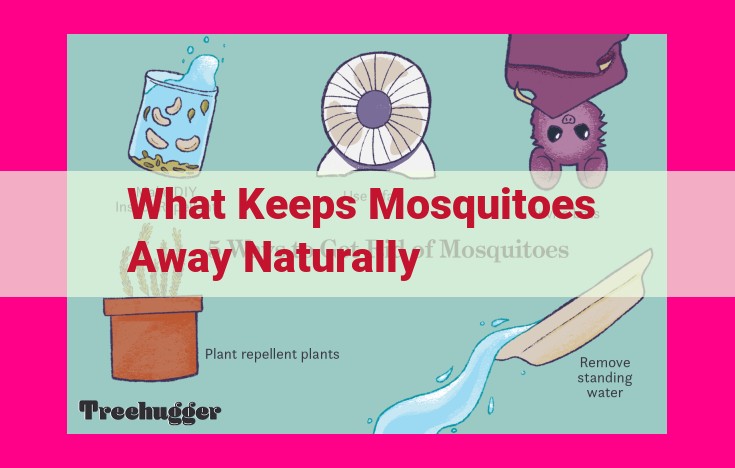Effective Mosquito Repellent Strategies: Natural, Physical, And Environmental Solutions

For natural mosquito repellence, utilize plant-based options like citronella, eucalyptus, lavender, and peppermint, either as whole plants or essential oils. Physical barriers like mosquito nets and ThermaCELL repellents provide protection. Controlling environmental factors, such as eliminating standing water and dense vegetation, reduces breeding grounds. Understand weather conditions and peak mosquito activity.
Natural Repellents: Keeping Mosquitoes at Bay with Nature’s Scents
The relentless buzz of mosquitoes can turn an evening picnic or a peaceful afternoon in the garden into a misery. Instead of resorting to harsh chemicals, you can turn to nature’s arsenal of effective and safe repellents to keep these pesky insects away.
Citronella: This classic mosquito repellent emits a strong, lemony scent that discourages mosquitoes from approaching. It can be used in candles, incense sticks, or applied directly to your skin.
Eucalyptus: As an essential oil, eucalyptus has proven to be an effective repellent. Its pungent aroma acts as a natural barrier, deterring mosquitoes from landing on your skin.
Lavender: The soothing and calming scent of lavender not only relaxes you but also repels mosquitoes. You can sprinkle lavender oil around your outdoor space or apply it directly to your clothing.
Peppermint: The invigorating scent of peppermint is not only refreshing but also repels mosquitoes. It can be used in diffusers, spray bottles, or applied to the skin as a lotion.
**Essential Oils: Nature’s Mosquito Repellent Shield**
When the buzzing of mosquitoes threatens to spoil our outdoor adventures, essential oils come to our rescue as a natural and effective defense. These aromatic liquids, extracted from plants, possess potent insect-repelling properties that keep pesky mosquitoes at bay.
Citronella oil, derived from lemongrass, is a well-known mosquito repellent. Its strong, citrusy scent disrupts the mosquito’s ability to locate its target. Eucalyptus oil, with its fresh, medicinal aroma, is another powerful mosquito deterrent. It contains compounds that mosquitoes find unappealing.
Lavender oil, renowned for its calming effects, also boasts mosquito-repelling capabilities. Its floral fragrance creates a soothing environment while effectively keeping mosquitoes away. Finally, peppermint oil, with its invigorating aroma, acts as a natural mosquito repellent. Its cooling effect provides an added touch of comfort while protecting you from mosquito bites.
How to Use Essential Oils for Mosquito Control:
- Diffusing: Add a few drops of your chosen essential oil to a diffuser and let it disperse throughout the room.
- Topical application: Dilute a few drops of essential oil in a carrier oil, such as jojoba or coconut oil, and apply it to exposed skin.
- Spray: Mix a few drops of essential oil with water in a spray bottle and mist it around your surroundings.
- Wearable devices: Add a few drops of essential oil to a cotton ball or tissue and place it inside a wristband or necklace. This allows you to carry the repellent with you wherever you go.
By incorporating essential oils into your mosquito control routine, you can enjoy your outdoor activities without the constant annoyance of mosquito bites. These natural repellents provide safe, effective, and aromatic protection, keeping mosquitoes at a distance and allowing you to embrace the beauty of the outdoors.
Physical Barriers: Shielding Yourself from Mosquito Bites
Mosquitoes, those pesky little creatures, are relentless in their pursuit of human blood. But fear not, for there are ways to create a physical barrier between you and these unwanted guests.
Mosquito Nets: A Haven from the Swarm
Imagine a cozy canopy, suspended above your bed or campsite, offering a sanctuary from the mosquito onslaught. Mosquito nets are made of fine mesh that effectively blocks mosquitoes from reaching your skin. Whether you’re catching some shut-eye under the stars or enjoying a peaceful night’s sleep indoors, a mosquito net is an invaluable defense against these relentless pests.
ThermaCELL Mosquito Repellants: A Zone of Protection
Technology has also come to our aid in the fight against mosquitoes. ThermaCELL mosquito repellants release a powerful repellent into the air, creating an invisible barrier that keeps mosquitoes at bay. These devices are perfect for outdoor activities like picnics, backyard barbecues, or simply enjoying your patio without the annoyance of unwanted bites.
The Power of Barriers
By creating physical barriers with mosquito nets and ThermaCELL devices, you can effectively reduce your exposure to mosquitoes. These barriers block their access to your skin, preventing them from biting and potentially transmitting diseases. Remember, prevention is key when it comes to mosquito control, and these physical barriers are a crucial line of defense in keeping you safe and comfortable.
Environmental Factors: Eliminating Mosquito Breeding Grounds
Mosquitoes, those pesky insects that can leave us with itchy bites and the risk of disease, thrive in certain environmental conditions. Understanding these factors and taking steps to control them is crucial for reducing mosquito activity and protecting ourselves.
Standing Water: A Mosquito Nursery
One of the most important environmental factors to address is the presence of standing water. Mosquitoes lay their eggs in water, and even a small puddle can provide a fertile breeding ground. Eliminating standing water is key to breaking the mosquito life cycle. Regularly check your property for sources of standing water, such as clogged gutters, bird baths, and unused pools. Drain or eliminate any standing water you find to prevent mosquitoes from laying their eggs.
Dense Vegetation: A Mosquito Haven
Dense vegetation provides a shady, humid habitat that mosquitoes love. Long grass, overgrown shrubs, and thick undergrowth create an ideal environment for mosquitoes to rest, hide, and breed. To reduce mosquito populations, keep your lawn trimmed, and eliminate dense vegetation around your home. Clear away leaf litter and debris that can trap moisture and provide hiding places for mosquitoes.
By controlling standing water and dense vegetation, you can significantly reduce mosquito breeding grounds and make your environment less attractive to these biting pests. Remember, taking these steps not only protects you from mosquito bites but also helps prevent the spread of mosquito-borne diseases. Maintain a clean, dry environment to keep mosquitoes at bay and enjoy a more comfortable outdoor space.
**Weather Conditions and Mosquito Activity**
Warm, Humid Climates:
Mosquitoes thrive in warm, humid environments where there is ample moisture for them to lay their eggs. These conditions are ideal for mosquito breeding and lead to increased populations. In such climates, mosquitoes can be found in abundance throughout the year.
Dusk and Dawn Activity:
Mosquitoes exhibit increased activity during dusk and dawn. The cooler, more humid conditions of these times create a favorable environment for their feeding habits. Female mosquitoes, which are responsible for biting humans, are most active at these times to seek blood meals. They are particularly attracted to exposed skin and dark colors, making it crucial to take precautions during these periods.
By understanding the relationship between weather conditions and mosquito activity, individuals can minimize their risk of exposure. Avoiding outdoor activities during dusk and dawn or taking steps to protect oneself, such as wearing long sleeves and pants and using insect repellent, is essential during these high-risk times.
Mosquito Control: Effective Measures for a Bite-Free Summer
Mosquito-Borne Diseases and Symptoms
Mosquitoes aren’t just a nuisance; they can also pose a serious health risk. They are vectors for several deadly diseases, including malaria, dengue fever, and Zika virus. Common symptoms of mosquito bites can range from mild discomfort to severe fever and chills.
The Mosquito Life Cycle
Understanding the mosquito life cycle is crucial for effective mosquito control. Mosquitoes lay their eggs in standing water, and the larvae hatch into wrigglers that feed on organic matter in the water. After a few days, the wrigglers transform into pupae, and then into adult mosquitoes.
Mosquito Breeding Grounds
Mosquitoes thrive in areas with stagnant water, such as ponds, birdbaths, and clogged gutters. Eliminating these breeding grounds is essential for reducing mosquito populations near your home. Regularly empty or cover objects that can hold water, and keep your gutters clean.
Effective Mosquito Control Measures
Chemical Repellents:
- DEET, picaridin, and permethrin are among the most effective chemical repellents available. They work by creating a barrier on your skin that mosquitoes are reluctant to cross.
Natural Repellents:
- Certain plants, such as citronella, eucalyptus, and peppermint, release scents that repel mosquitoes. Consider planting these plants around your home or using their essential oils in a diffuser.
Physical Barriers:
- Mosquito nets and ThermaCELL mosquito repellants create a physical barrier between you and mosquitoes. Netting is most effective for sleeping areas, while ThermaCELLs release a repellent that creates a protective zone around you.
Environmental Management:
- Removing or reducing standing water sources around your property can significantly impact mosquito populations. Regularly drain birdbaths, ponds, and pools, and remove clogged gutters and debris.
By understanding mosquito biology and implementing effective control measures, you can significantly reduce your risk of mosquito bites and the diseases they can transmit. Make mosquito control a part of your summer routine and enjoy a bite-free season.





